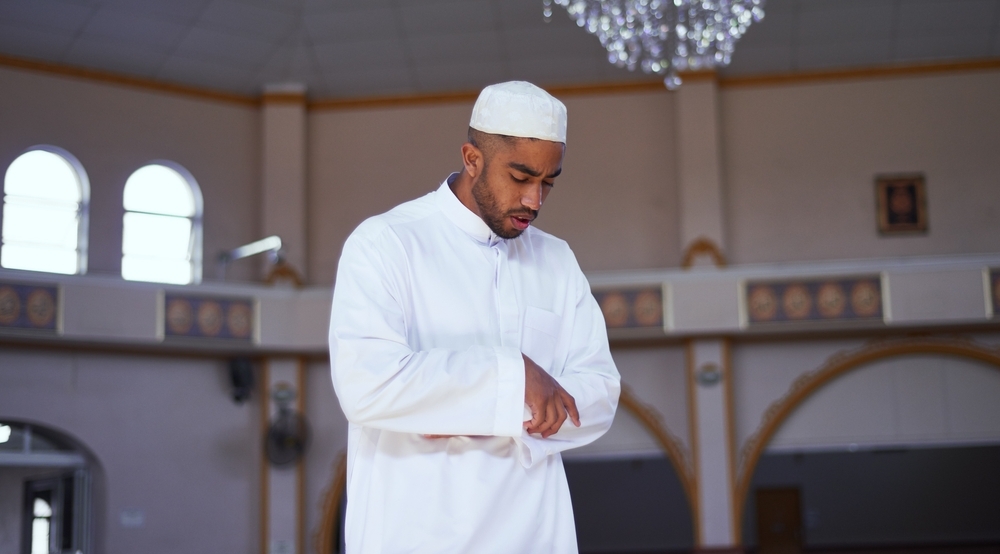Closing One’s Eyes in Prayer: A Detailed Answer
Hanafi FiqhHanbali FiqhShafi'i Fiqh
Answered by Shaykh Faraz Rabbani
Question
What is the ruling of closing one’s eyes in prayer? Where should one look when praying?
Answer
To close one’s eyes in prayer is somewhat disliked. This is because:
- it entails leaving the sunna of looking at the place of prostration,
- it resembles the worship of the Jews, and
- it is reported from the early Muslims that they disliked this.
There is a weak hadith regarding this, which is not sufficient as proof (in itself) but supports these other considerations.
However:
- if one does not gain full attentiveness or is distracted in prayer if one’s eyes are open, then it would be permitted (or, perhaps, even better) to close one’s eyes.
The Position of the Four Schools:
The above is a summary of what Imam Haskafi said in Durr al-Mukhtar, Ibn Abidin in Radd al-Muhtar, Ibn Nujaym in al-Bahr al-Ra’iq, and Imam Kasani in Bada’i‘ al-Sana’i‘, in Hanafi fiqh.
This ruling was also confirmed by what Imam Buhuti said in Kashshaf al-Qina‘ in Hanbali fiqh; and Imam Dardir in al-Sharh al-Saghir in Maliki fiqh.
Within the Shafi‘i school, it is transmitted that it is disliked to close one s eyes. However, Imam Nawawi chose that it is not disliked in his Majmu‘ and also in his Minhaj, which some interpreted as saying it is absolutely permitted to close one s eyes, and others that it is better not to (khilaf al-awla), unless it aid s one s presence of heart.
Reason for Dislikedness and the Place of the Eyes in Prayer
Imam Buhuti mentioned in his Kashshaf al-Qina‘ that a reason for its being disliked is that it can be a means for one becoming drowsy, such as when praying at night.
Imam Kasani explained in his Bada i` that the reason for looking at one s place of prostration is that each limb of the body has a share in the prayer s worship. Imam Ibn Nujaym mentioned that one does not close one s eyes in prostration, either, and mentioned that, “A number of Sufis (may Allah benefit us through them) said that one keeps one s eyes open because the eyes too prostrate.”
Imam Abu Bakr al-Jassas (Allah have mercy on him) mentioned in his magnificent Quranic tafsir of the verses relating to legal rulings, Ahkam al-Qur an, explaining the words of Allah Most High in Surat al-Muminin, “Successful indeed are the believers, who are reverent in prayer,” [Quran, 23:1-2] that:
- Muhammad Ibn Sirin reported that the Prophet (Allah bless him & give him peace) used to look up to the sky while praying. After this verse, he used to keep his head lowered.
- It has also been reported from him that after this verse was revealed, the Companions would lower their gazes until their eyes did not go beyond their place of prostration.
- It has been reported from Ibrahim, Mujahid, and Zuhri that they said, “Reverenece (khushu‘) is being still.”
- It has been reported that Sayyiduna Ali (Allah be pleased with him) said, “Reverence is in the heart and to avoid distractions in prayer.”
- Hasan al-Basri said, “The reverent are the fearful.”
- Abu Bakr al-Jassas commented: “Reverence (khushu‘) is all these meanings: being still in prayer, humble, not getting distracted, not looking around or moving, being fearful of Allah.”
- This is why it is reported that Sayyiduna Ibn Mas‘ud (Allah be pleased with him) would be like a thrown garment (in his stillness, and once in prayer, he would lower his voice, body, and gaze.)
And Allah alone gives success.
[Shaykh] Faraz Rabbani
Shaykh Faraz Rabbani spent ten years studying with some of the leading scholars of recent times, first in Damascus, and then in Amman, Jordan. His teachers include the foremost theologian of recent times in Damascus, the late Shaykh Adib al-Kallas (may Allah have mercy on him), as well as his student Shaykh Hassan al-Hindi, one of the leading Hanafi fuqaha of the present age. He returned to Canada in 2007, where he founded SeekersGuidance in order to meet the urgent need to spread Islamic knowledge–both online and on the ground–in a reliable, relevant, inspiring, and accessible manner. He is the author of: Absolute Essentials of Islam: Faith, Prayer, and the Path of Salvation According to the Hanafi School (White Thread Press, 2004.) Since 2011, Shaykh Faraz has been named one of the 500 most influential Muslims by the Royal Islamic Strategic Studies Center.
